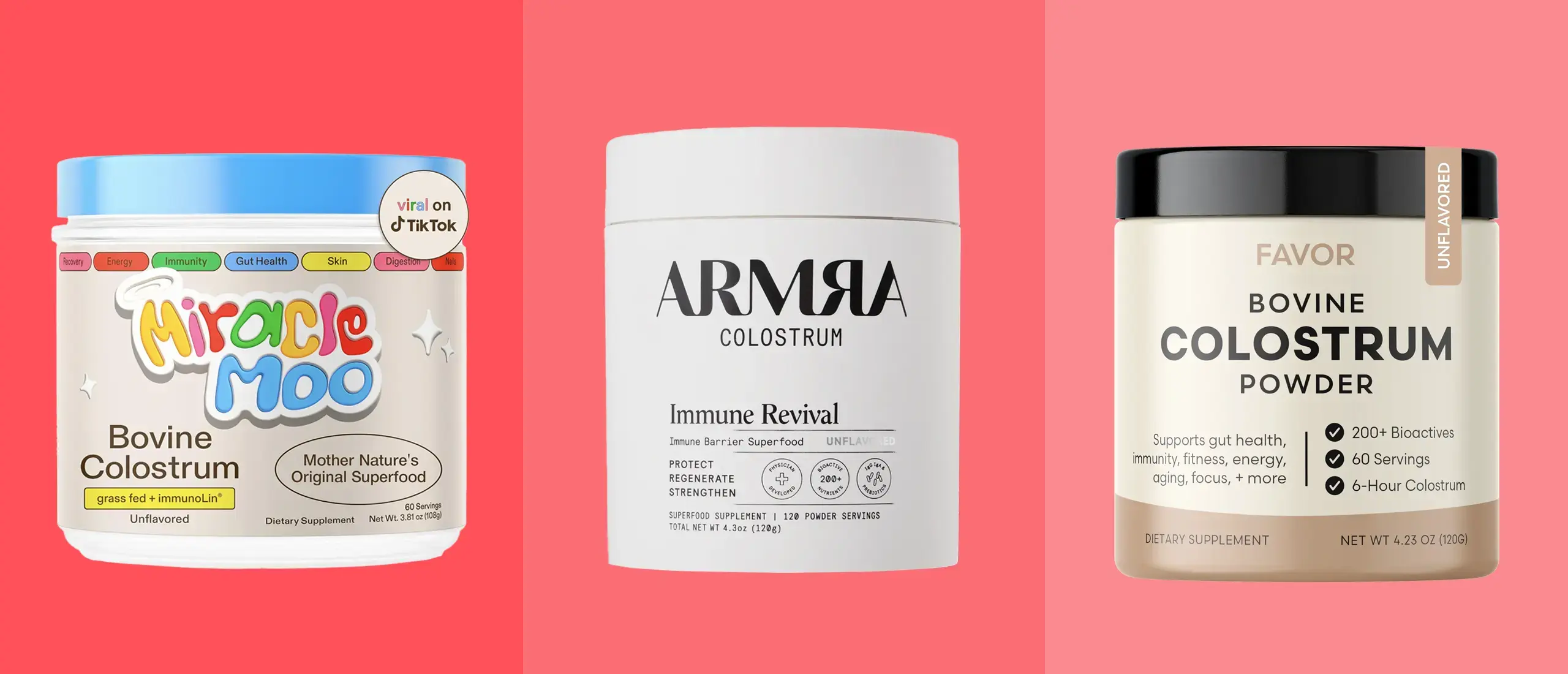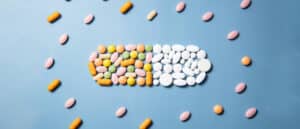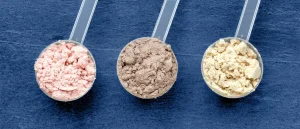The 7 Best Colostrum Supplements to Boost Gut Health and Athletic Performance
- By Joy Manning
- March 19, 2024
Our product recommendations are selected by editors, tested first-hand, or expert-approved. We may earn a commission through links on our site.
When your gut needs a tune-up, probiotics seem like the obvious go-to. But they aren’t the only gut- and immune-boosting supplement out there. Colostrum—the first milk produced by mammals (like cows and goats) immediately after giving birth—is phenomenally nutrient-rich, providing newborns with antibodies, antimicrobial proteins, and other vital nutrients. Emerging studies suggest it may improve gut health, support immune function, and boost sports performance in adults, too (1).
But that doesn’t mean you need to search every dairy farm for fresh postpartum milk. Colostrum comes in both powder and pill form for easy everyday supplementation. Here’s everything to know about colostrum, including the best colostrum supplements money can buy.
About the Experts
Claire Rifkin, MS, RDN, is a registered dietitian based in New York City.
Inna Yegorova, PhD, is a dietary supplement compliance expert and the founder of Inna Consulting.
Benefits of Colostrum Supplements
Here’s what existing studies suggest about the potential of colostrum supplements and your health.
May improve gut health
“Bovine colostrum contains factors that support gastrointestinal health, such as growth factors that promote the growth and repair of intestinal tissues,” explains dietary supplement compliance expert and researcher Inna Yegorova, PhD. “It also contains compounds like lactoferrin and lactoperoxidase—which may help maintain a healthy balance of gut bacteria (2).” The unique combination of factors and compounds in colostrum may reduce gut permeability and prevent leaky gut, suggests a 2022 review (3).
May boost sports performance
Research has shown that colostrum can give athletes a competitive edge, especially during tough training. A small study that followed soccer players for six weeks suggests that colostrum supplements may boost athletic performance, recovery, and muscle mass (4). “This is probably because of colostrum’s protein content, growth factors, and potential anti-inflammatory properties,” says Yegorova. Athletes should note that it is on the NCAA Banned Substances list, but not on any banned list for professional athletes (5).
May support immune function
Colostrum contains high levels of immunoglobulins—particularly immunoglobulin G (IgG)—which could help give your immune system a boost (1). These antibodies are the body’s first line of defense against pathogens, potentially reducing the risk of infections, says Yegorova.
May support bone health
Emerging research suggests that colostrum supplementation could be beneficial for bone health. One small study found that bovine colostrum may be effective at reducing bone resorption in older adults—who are at a higher risk of osteoporosis (6). Animal studies also hint that colostrum could improve bone density and reduce the risk of osteoporosis (7). Still, more research in humans is needed.
Safety and Risks of Colostrum Supplements
Though the emerging research is largely encouraging about colostrum, the jury is still out about whether this is a must-have supplement for great health. “While there have been some positive findings, there aren’t any conclusive results in terms of understanding colostrum’s effects, optimal dosages, and long-term safety,” says registered dietitian Claire Rifkin, MS, RDN.
Some people might experience side effects, like upset stomach, particularly when taking high doses. “People who are allergic to milk should avoid colostrum supplements, as they may trigger an allergic reaction,” says Rifkin.
Colostrum also contains lactose, so colostrum supplements aren’t suitable for people with lactose intolerance. Goat colostrum contains less lactose than bovine colostrum, so it might be an option for those with more minor intolerances. However, it’s best to check with your healthcare provider to see if it’s right for you.
Even if dairy and lactose don’t give you issues, start with a low dose and gradually increase it to gauge your tolerance, adds Yegorova.
What to Look for in a Colostrum Supplement
When choosing a supplement, Yegorova says it doesn’t matter whether you pick a pill or powder. In terms of dosage, there is no standard recommended amount. “The appropriate dosage of colostrum can vary depending on age, health status, and specific health goals,” says Yegorova. “Typical doses for adults range from one to two grams.”
Both Yegorova and Rifkin advise reading labels closely to ensure the quality and effectiveness of the products. Here are the factors they look for when shopping for colostrum:
Collection time
According to Yegorova, the timing of colostrum collection is crucial. About two to three days after birth, the colostrum’s quality declines. Look for products that specify when the colostrum was collected relative to the cow giving birth to ensure its potency.
Some brands also specify that they have a calf-first policy. This means baby cows (or other animals like goats) get all the colostrum they need first, and only the leftovers are used to make supplements.
Third-party testing
“Third-party testing means that the supplement has been evaluated by an independent laboratory that is unaffiliated with the brand,” says Rifkin. A USP, NSF, or Informed-Choice certification offers unbiased verification that the supplement meets its label claims and is free from harmful contaminants, offering an additional layer of assurance for safety and effectiveness, she adds.
Check how it was pasteurized
Seek out supplements that use low-temperature or long-time pasteurization. “This helps preserve important nutrients like immunoglobulin G while effectively reducing the risk of harmful pathogens,” says Yegorova.
Look at how it was dried
“Freeze-drying is generally preferred over spray drying,” says Yegorov. She says freeze-dried colostrum is less likely to suffer protein damage.
Consider grass-fed
Colostrum supplements sourced from grass-fed bovine may contain higher levels of beneficial nutrients, such as omega-3 fatty acids and antioxidants, according to Rifkin (8, 9). “Grass-fed cows are also generally healthier, potentially offering a more effective form of colostrum that better supports overall wellness.”
The Best Colostrum Supplements
If you follow Yegorova and Rifkin’s shopping tips, you’ll be set to select a top-notch colostrum supplement. However, after sifting through dozens of supplements, ARMRA is the only colostrum supplement that checked all the boxes—including being sourced from grass-fed cows, undergoing third-party testing, and following best practices for collection and processing. Still, each formula has different perks. Here are your seven best options.
References
1. Playford, R. et al (2021). Bovine Colostrum: Its Constituents and Uses.
2. Menchetti, L. et al. (2016). Potential Benefits of Colostrum in Gastrointestinal Diseases.
3. Dziewięcka, H. et al (2022). A Systematic Review of the Influence of Bovine Colostrum Supplementation on Leaky Gut Syndrome in Athletes: Diagnostic Biomarkers and Future Directions.
4. Kotsis, Y. et al (2018). A low-dose, 6-week bovine colostrum supplementation maintains performance and attenuates inflammatory indices following a Loughborough Intermittent Shuttle Test in soccer players.
5. Davison, G. et al. (2021). The Use of Bovine Colostrum in Sport and Exercise.
6. Duff, W. et al. (2014). The Effect of Bovine Colostrum Supplementation in Older Adults Resistance Training.
7. Du, M. et al (2011). Protective effects of bovine colostrum acid proteins on bone loss of ovariectomized rats and the ingredients identification.
8. Benbrook, C. et al. (2018). Enhancing the Fatty Acid Profile of Milk Through Forage-Based Rations, with Nutrition Modeling of Diet Outcomes.
9. Vliet, S. et al. (2021). Health-Promoting Phytonutrients Are Higher in Grass-Fed Meat and Milk.
10. ALKaisy, Q. et al. (2023). Exploring the Health Benefits and Functional Properties of Goat Milk Proteins.












